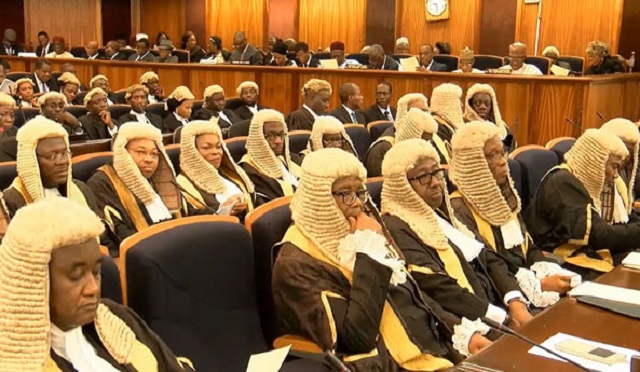How To Maintain Judicial Independence in Nigeria
The judiciary is the third arm of government in Nigeria that is responsible for the interpretation of laws and trial of cases involving individual citizens, organizations and the state. The independence of the judiciary simply means judicial protection from the control of the executive, legislature and/or any other body.

Judges in Nigeria image credit: Nigerian Infopedia
Judicial Independence simply means that judges should have full powers to try cases brought before them without fear or favour.
With the rule of law being neglected and the encroachment of the executive into the affairs of the judiciary in Nigeria at times, this post is written to address executive infringement into the judicial system of Nigeria and promote judicial independence.
Let us look at the few ways we can maintain judicial independence in Nigeria and why there should as a matter of urgency be judicial independence in Nigeria.
HOW TO MAINTAIN JUDICIAL INDEPENDENCE IN NIGERIA
1. Judges should be appointed from proven members of the bar. This should be based on the advice of a body of knowledgeable persons. In Nigeria, such a body is the Judiciary Advisory Commission.
2. Judges should be immune, as obtains in almost every country, from prosecution for anything they say in the performance of their duties.
3. Judicial officers should enjoy security of tenure, and may only be removed on grounds of ill-health or gross misbehaviour.
4. Judicial officers should be well paid, and their remuneration should not be subject to executive or legislative manipulation.
5. The principle of separation of powers, with its inbuilt checks and balances should apply especially regarding the judiciary.
6. Judges must not belong any political party in order not to be influenced by political considerations in the discharge of their duties.
7. Judicial officers must be seen to be persons of high moral standard. In this way, they will gain the confidence of the people.
8. Judges must be provided with adequate security for their personal safety.
WHY THERE SHOULD BE JUDICIAL INDEPENDENCE IN NIGERIA
1. The rights and liberty of the citizens will be better defended where the judiciary is free from control by the other arms of government.
2. Judicial Independence would guard against tyranny in the state by ensuring against improper use of power by the executive and the legislature.
3. Judicial Independence helps to ensure that justice is dispensed fairly to all.
4. Judicial Independence helps to protect the constitution through objective interpretation whenever necessary.
5. Judicial Independence would ensure that judges themselves are not victimised by the executive on account of any proper judgements they have given.
6. Judicial Independence would ensure that only fully qualified judges are appointed to the judiciary, free from political considerations.
IS THE JUDICIARY IN NIGERIA INDEPENDENT?
Looking at the judicial landscape in Nigeria and the political climate, it can be said that the judiciary in Nigeria isn’t independent as the executive arm of government are fond of muzzling/disobeying the judiciary. Reports of arrest of judges, contempt of court, disobedience of court orders, killings of judges and forceful removal of judicial officers are just but a few reasons why the judiciary might never be independent in Nigeria.
CONCLUSION
While the judiciary is seems independent on paper, we see that with the current political landscape in the country that it might just be practically impossible to have an independent judiciary in Nigeria for effective justice. Nigerians, do you support judicial independence? Use the comments section to air your views.